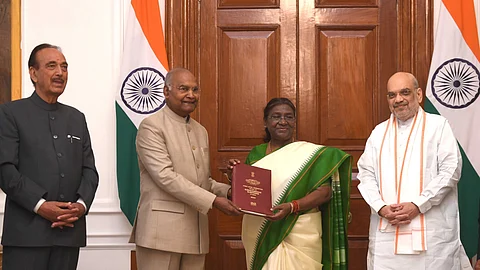

A high-level committee headed by former President Ram Nath Kovind submitted a report to President Droupadi Murmu at the Rashtrapati Bhavan in New Delhi on Thursday, March 14, backing the Union government’s push for the implementation of the ‘One Nation, One Election’ policy across the country. The committee was appointed on September 2, 2023, to examine and make recommendations on the proposal to hold simultaneous polls to the Lok Sabha, state assemblies, municipalities and panchayats.
In its report, which runs to over 18,000 pages, the committee said it found the “loss of simultaneity in elections” after the first two decades of India’s independence had a “baneful effect” on the country’s economy, polity, and society. The recommendations made by the committee are as follows.
How to hold simultaneous elections
The committee recommended that simultaneous elections to the Lok Sabha and the state assemblies can be held in the first phase, followed by elections to the local self-governments within 100 days as the second step.
To ensure the synchronisation of elections to the Lok Sabha and state assemblies, the committee has suggested the introduction of Article 82A. As per the panel’s recommendation, the President of India must bring into force these amendments, by issuing a notification to this effect, on the date of the first Lok Sabha sitting after the upcoming general elections. The tenure of all state assemblies that come to power thereafter would extend only for the period until the next Lok Sabha elections, the panel suggested.
This means that while Kerala, for instance, is headed for its next assembly elections in 2026, the newly elected state government’s term would last only for three years until 2029, when the next Lok Sabha elections are expected to be held. After that, (from 2029), all elections to the Lok Sabha and the state governments are to be held simultaneously, suggested the committee. It also called for the formation of an ‘implementation group’ to look into the execution of these recommendations.
Amendments required to Constitution
The panel also suggested the insertion of Article 324A to the Constitution to hold simultaneous elections for local bodies, which reads as follows: “Notwithstanding anything in (Article 243E and 243U), Parliament may by law make provision for ensuring that the elections to Municipalities and Panchayats are held simultaneously with the General Elections, and for this purpose, make provisions as may be necessary, including provisions for determination of the term of the Municipalities and Panchayats sooner than the expiry of five years from the date appointed for their first meeting, and for limiting the term of such Municipalities and Panchayats.”
The committee has also recommended an amendment to Article 325 for enabling a single electoral roll and single elector’s photo identity card. This recommendation, however, needs to be ratified by the state governments, as the governance of local bodies fall under the state list. Such a ratification is not required to hold simultaneous elections to the Lok Sabha and state assemblies.
What if a hung house emerges
In the event of a hung house, a no-confidence motion or similar events, the Kovind committee suggested that fresh elections can be held for the remainder of the five-year term. If this happens in a state assembly election too, fresh elections are to be held, and unless sooner dissolved, the new government shall continue till the completion of the Lok Sabha term.
For this, the panel said, a Constitutional Amendment Bill will have to be introduced in the Parliament amending Article 83 (Duration of Houses of Parliament) and Article 172 (Duration of State Legislatures). These amendments need not be ratified by the states.
Logistics and manpower
According to the panel, to make logistical arrangements for the conduct of simultaneous elections, the Election Commission of India (ECI) may draw a plan and estimate in advance the procurement of equipment such as electronic voting machines (EVMs) and Voter-verified paper audit trails (VVPATs), deployment of polling personnel and security forces, and make other necessary arrangements. Similarly, the State Election Commissions (SECs) are expected to do the same for the respective state elections.
The panel’s members are Union Home Minister Amit Shah, former Leader of the Opposition in the Rajya Sabha Ghulam Nabi Azad, former Finance Commission chairman NK Singh, former Lok Sabha Secretary General Subhash C Kashyap, senior advocate Harish Salve, and former Chief Vigilance Commissioner Sanjay Kothari. Union Law Minister Arjun Ram Meghwal is a special invitee, while Niten Chandra IAS, Secretary of the Department of Ex-Servicemen Welfare under the Ministry of Defence, is the secretary of the committee. The members reportedly deliberated on this subject for 191 days after its constitution.
Leader of the Congress in Lok Sabha Adhir Ranjan Chowdhury was also invited to be a part of the panel, but he opted out after calling the exercise an “eye wash.” He alleged that even before the consultation process began, the panel was in favour of recommending simultaneous polls.
The 22nd Law Commission had also suggested holding simultaneous polls from the general election of 2029. The Law Commission, which already submitted its views to the high-level panel, is also likely to submit its final report to the Law Ministry soon.